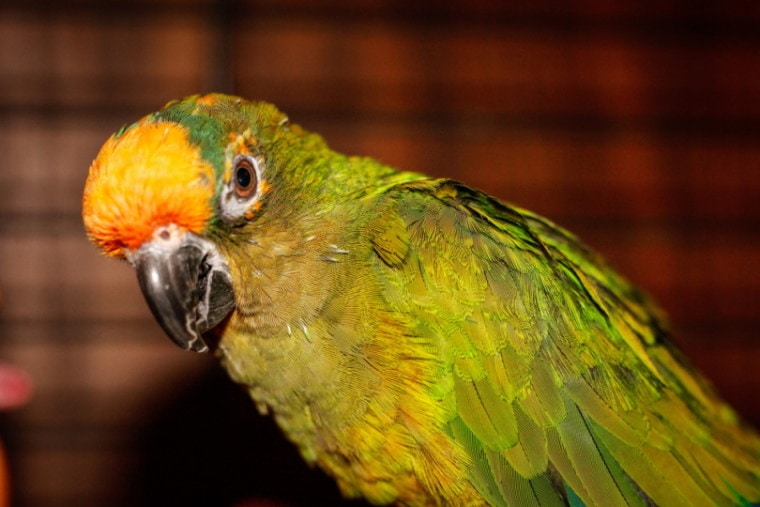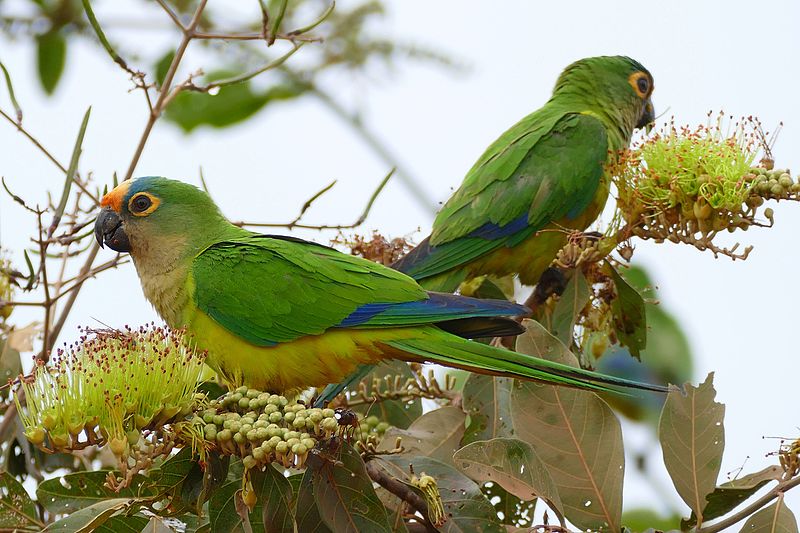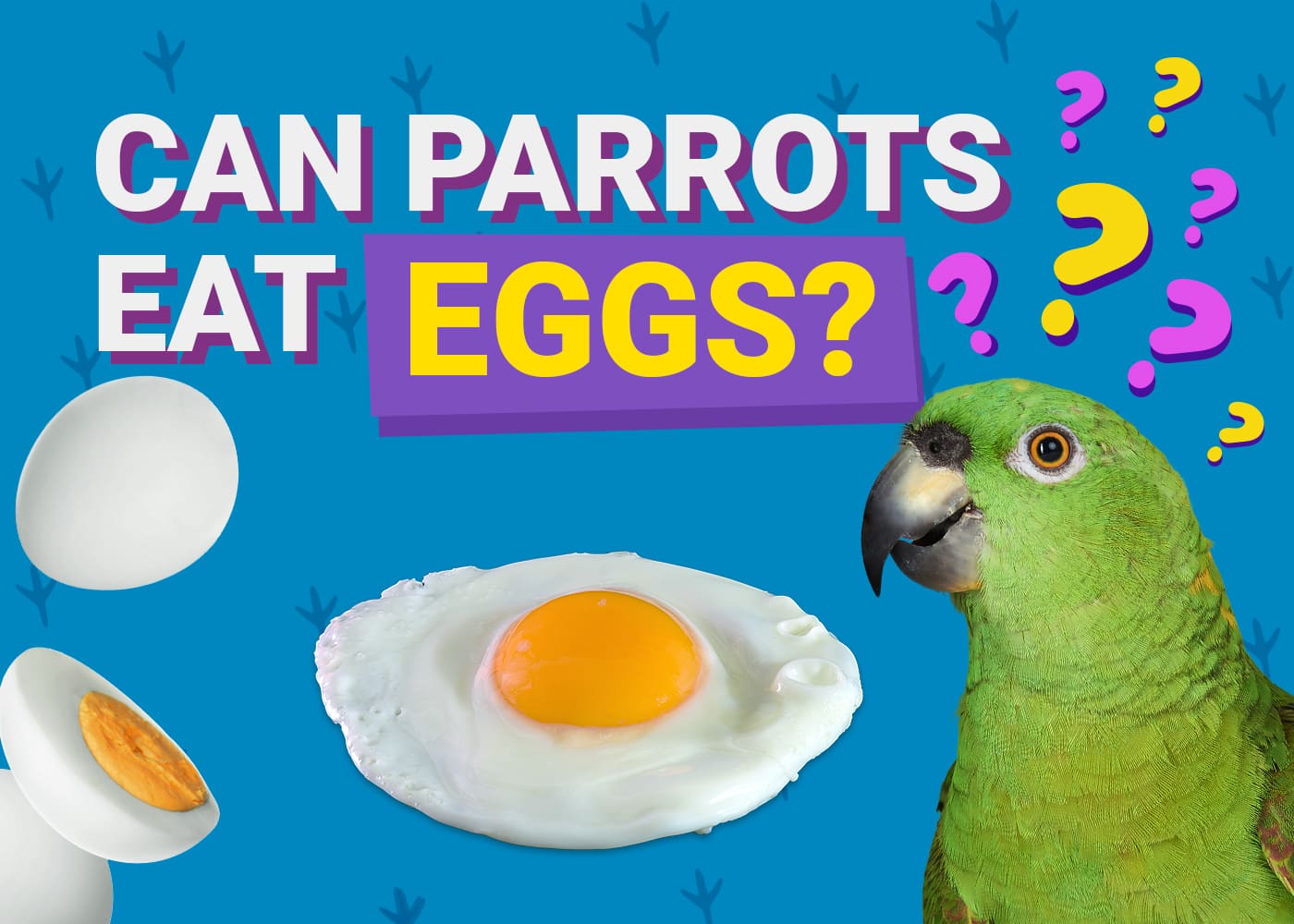
The Peach-fronted Conure is a small, brightly colored bird that you can find in parts of South America. Although they are closely related to the Green-Cheeked Conures, the Peach-fronted conures have slightly different personalities than their cousins. These birds are active and inquisitive but also playful and gentle with humans.
They make excellent pets for adults or children who want an interactive pet that doesn’t easily bite or scream at you! Read on to learn more about this adorable bird species.
Species Overview
| Common Names: | Peach-Fronted Conure |
| Scientific Name: | Eupsittula aurea |
| Adult Size: | 10–11 inches |
| Life Expectancy: | 20–30 years |
Origin and History
The Peach-fronted conure is native to South and Central America. It lives in the northern parts of Colombia, Ecuador, Peru, and Venezuela. They are hardy birds that can tolerate a wide variety of climates. These birds have been captured from the wild for as long as records exist. It was only recently that many became domestic pets instead of being kept by scientists or zoos only. This bird prefers tropical areas and forests.
Unfortunately, there is little information available about the exact population of these birds in the wild. Their numbers are not thought to be declining at this time, among pet owners or in their native habitats.

Temperament
Although they are generally friendly, Peach-fronted conures can sometimes be rather aggressive with other birds. The Peach-fronted conure does best when it is kept alone or with one other companion bird introduced into its cage before you bring your pet home for the first time. This breed is recommended for older children due to their tendency towards nipping, but they will warm up to children over time once they get used to each other.
These are sweet, playful birds that quickly bond with their human owners. This makes them wonderful pets for adults or children who want to spend time playing with their pet bird. They enjoy being handled by humans frequently and will return the favor by showering you with kisses if you stroke their head gently from top to bottom (going against the feathers.) Peach-fronted conures are highly intelligent birds that need lots of toys and opportunities to play to keep them as happy as possible. These birds also require plenty of attention daily; they can’t be left alone in their cage for long periods.
The Peach-fronted conure loves to climb, and they will happily spend hours perching in the top branches of a hanging toy or on the highest branches in a tree inside your home. These birds enjoy baths and can often be seen splashing around gleefully during bath time. They are also very vocal, with soft chirps and warbling sounds that add extra personality to this wonderful bird species. Peach-fronted conures are more social than most Conure species, but they still need plenty of attention from their owners to stay happy and healthy pets.
If you require a lot of peace and quiet, then this might not be the bird for you.
Speech & Vocalizations
Peach-fronted conures are not known for their ability to mimic human speech, but they can make a variety of sounds, and they will happily “talk” to you if you encourage them to do so.
Peach-fronted conures are known for their ability to speak at length. They use soft chirps as a form of communication with other flock members, but these birds can also make more complex noises like whistling or even warbles. You might occasionally hear some human words from your Peach-fronted conure that it has picked up over time from being around humans so often.
In fact, most Peach-fronted conures love people so much that they will happily imitate whatever sounds they hear. This is sometimes irritating because the bird may start mimicking human voices in an attempt to get attention from you, but it can be quite endearing too.
If you have an amusing voice or accent, your Peach-fronted conure will copy it and use the same voice to try and get your attention.
Your Peach-fronted conure might not talk as often as other birds do, but he still uses that cute chirp and whistle just the same!

Peach-Fronted Conure Markings and Colors
You probably guessed from its name that this bird has a peach-colored forehead instead of the usual bright orange or red forehead that you see in most other conure species. The Peach-fronted conures feathers are mostly green in color with a few touches of blue and aqua. The underside of the bird is light pink to match its beak and claws.
Peach-fronted conures have long tail feathers, very similar to those found on macaws and cockatoos, which helps them communicate with each other through visual displays and mimicking sounds like whistles and chirps.
Caring for the Peach-Fronted Conure
If you consider caring for a Peach-fronted conure, you will need to be prepared to spend some time looking after this bird. Peach-fronted conures love their toys, and they like plenty of attention from humans, too, so you cannot expect to keep them as pets if you have limited time available to spend with your feathered friend.
Peach-fronted conures belong inside the home in an environment just as comfortable as any other pet enjoys, though they can live outside if it is cool enough. You should provide them with plenty of fresh cold water at all times. The ideal temperature for your bird should range between 68 and 86 degrees Fahrenheit during cold months (with cooler temperatures at night) and between 80 and 90 degrees during warm weather.
These birds need plenty of toys because they love chewing on things. Try to provide your bird with plenty of perches and toys, and you will have a much happier bird. Peach-fronted conures are known for their curiosity, so if you want them to be satisfied in the home, it’s best not to leave anything lying around that could pose a safety hazard.
This is a great pet for families who live in places where there are other children because Peach-fronted conures get along well with kids, and they learn very quickly from interacting with humans. However, older children should be warned never to poke or prod this bird but rather let him come to you if he wants attention.
You can keep them with other birds if you want, but make sure that the other birds don’t bully your Peach-fronted conure.

Common Health Problems
The Peach-fronted conure is a very hardy bird as long as it is doing well in its environment and receiving the proper nutrition, though, like all pet birds, it could still contract a disease or illness that might be fatal. As with human beings, stress can weaken the immune system of any animal, so make sure to get your bird all of the vitamins, nutrients, and exercise that he needs to stay healthy.
Peach-fronted conures are very playful birds, but their favorite toys can cause them serious damage if they get ahold of something too big to swallow or accidentally ingest small pieces that later become lodged inside their digestive system. Gently take away anything too big to swallow and give them only items that are approved for conures.
Check your bird’s dropping every day to ensure that they are loose and formed properly; if the pet has any problems with its digestive system, you will see changes in its droppings. These include diarrhea, constipation, or an increase in the number of droppings each day.
Even though Peach-fronted conures are relatively hardy birds, they still need to be taken to the veterinarian at least once a year for an examination and a complete physical. Watch out for any signs of illness in your bird and immediately take him in for treatment if anything unusual shows up.
Diet and Nutrition
The Peach-fronted conure is a relatively small bird, but even though this species does not grow as large as others, there are still some important things to consider regarding the diet.
First of all, your pet should be fed pellets that contain plenty of fresh fruits and vegetables along with vitamins and minerals. Try to include spinach, zucchini, sweet potatoes, carrots, and blueberries. You should also provide him/her with plenty of seeds such as sunflower seeds, dried fruits, or nuts such as almonds and hazelnuts daily.
Like most birds, the Peach-fronted conure should have fresh water available all of the time; the size of his beak and his small throat means that he will get dehydrated quickly if he doesn’t have access to water.
When food is in short supply, your pet bird may become desperate, so don’t ever leave it without something to eat for more than a few hours. Stress can cause many problems, including illness, so make sure that you are doing everything possible to keep your bird happy and healthy.

Exercise
The Peach-fronted conure is a very energetic bird who loves to play and exercise. He will go crazy for toys that he can chew up, such as walnuts or hickory nuts, and you should also give him some large pieces of wood to destroy in his cage. This keeps him from getting bored while still giving him something to do.
Additionally, he should get plenty of time outside with you each day where he can fly around and exercise his wings, legs, and beak on a large aviary in your yard.
Training a Peach-fronted conure is not difficult, as this bird has an excellent memory and learns quickly. They catch on to new words, tricks, and commands in just a short time, and once they get the hang of it, there is no stopping them from becoming sensational performers that you can show off to your family and friends.
Where to Adopt or Buy a Peach-Fronted Conure
Your local animal shelter should have several Peach-fronted conures up for adoption, and if you look online, then there are plenty of pet stores or breeders who will be happy to help you find an addition to your family. When buying your pet, be sure to inquire about where he was born. Birds can fly thousands of miles to get to your home, so you want to be sure that none of them have been trapped or held against their will before you buy or adopt a Peach-fronted conure.
Final Thoughts
When purchasing a Peach-fronted conure, it is essential to remember that these beautiful birds require special care. It may be tempting to buy one simply because they are cute and tiny, but this species has a long lifespan, so you will need to make long-term plans for your relationship.
Whether you follow all of the advice in this article about housing and feeding your conure or not, remember that you will need to do everything possible to keep your pet bird safe and happy. For example, the Peach-fronted conure is extremely friendly and intelligent. Still, his high energy level means that it can be difficult for him to adjust to living inside an apartment.
We have plenty of information available on all sorts of bird species. Check out the rest of our blog to learn more!
Featured Image Credit: Boost Life Photography, Shutterstock







